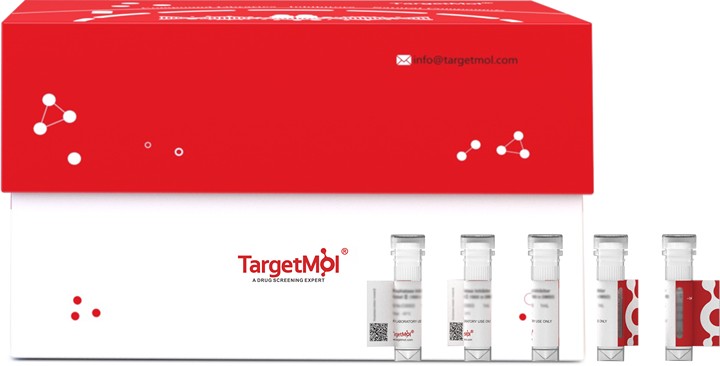Shopping Cart
- Remove All
 Your shopping cart is currently empty
Your shopping cart is currently empty

Murine polyomavirus (MPyV) (strain Kilham) VP1 Protein (E. coli, His) is expressed in E. coli expression system with C-6xHis tag. The predicted molecular weight is 42.4 kDa and the accession number is P24595.

| Pack Size | Price | Availability | Quantity |
|---|---|---|---|
| 20 μg | $360 | 20 days | |
| 100 μg | $745 | 20 days | |
| 1 mg | $2,530 | 20 days |
| Biological Activity | Activity has not been tested. It is theoretically active, but we cannot guarantee it. If you require protein activity, we recommend choosing the eukaryotic expression version first. |
| Description | Murine polyomavirus (MPyV) (strain Kilham) VP1 Protein (E. coli, His) is expressed in E. coli expression system with C-6xHis tag. The predicted molecular weight is 42.4 kDa and the accession number is P24595. |
| Species | MPyV |
| Expression System | E. coli |
| Tag | C-6xHis |
| Accession Number | P24595 |
| Synonyms | Major structural protein VP1,Major capsid protein VP1 |
| Amino Acid | APTVKKRTSQNQGLSPQKSQNSVVVGGIQVLDVRTGPDSITQIEAFLNPRMGKPVDSDFYGFSDNITVSADYTQDMPRIKELPCYSMAKISLPMLNEDMTCDTILMWEAISCKTEVVGVSSLTNCHSAVKRLYDNEGAGFPVQGLNFHFFSVGGEALDLQWLWKNYRCNYPAGVAALQAAPKAAQVLDPKLKAKLTADGKFPIEAWSPDPAKNENTRYFGTYTGGLQTPPVLQITNTTTTILLNENGVGPLCKGDGLYLASADIVGFRTQQNNKMHLRGLPRYFSIHLRKGCANPYPVSSLLNTFSSEMMPLNSWMLQVEEVRIYDGVERLPGDPDMIRYRIIWPGRLLSLIFPAMRHKHLYFFVMQAFIVL |
| Construction | 2-373 aa |
| Protein Purity | > 85% as determined by SDS-PAGE. |
| Molecular Weight | 42.4 kDa (predicted) |
| Endotoxin | < 1.0 EU/μg of the protein as determined by the LAL method. |
| Formulation | If the delivery form is liquid, the default storage buffer is Tris/PBS-based buffer, 5%-50% glycerol. If the delivery form is lyophilized powder, the buffer before lyophilization is Tris/PBS-based buffer, 6% Trehalose, pH 8.0. |
| Reconstitution | Reconstitute the lyophilized protein in sterile deionized water. The product concentration should not be less than 100 μg/mL. Before opening, centrifuge the tube to collect powder at the bottom. After adding the reconstitution buffer, avoid vortexing or pipetting for mixing. |
| Stability & Storage | Lyophilized powders can be stably stored for over 12 months, while liquid products can be stored for 6-12 months at -80°C. For reconstituted protein solutions, the solution can be stored at -20°C to -80°C for at least 3 months. Please avoid multiple freeze-thaw cycles and store products in aliquots. |
| Shipping | In general, Lyophilized powders are shipping with blue ice. Solutions are shipping with dry ice. |
| Research Background | Forms an icosahedral capsid with a T=7 symmetry and a 40 nm diameter. The capsid is composed of 72 pentamers linked to each other by disulfide bonds and associated with VP2 or VP3 proteins. Interacts with terminal alpha(2,3)-linked sialic acids on the cell surface to provide virion attachment to target cell. This attachment induces virion internalization predominantly through caveolin-mediated endocytosis. Once attached, the virion is internalized by caveolin-mediated endocytosis and traffics to the endoplasmic reticulum. Inside the endoplasmic reticulum, the protein folding machinery isomerizes VP1 interpentamer disulfide bonds, thereby triggering initial uncoating. Next, the virion uses the endoplasmic reticulum-associated degradation machinery to probably translocate in the cytosol before reaching the nucleus. Nuclear entry of the viral DNA involves the selective exposure and importin recognition of VP2/Vp3 nuclear localization signal. In late phase of infection, neo-synthesized VP1 encapsulates replicated genomic DNA in the nucleus, and participates in rearranging nucleosomes around the viral DNA. |

Copyright © 2015-2025 TargetMol Chemicals Inc. All Rights Reserved.